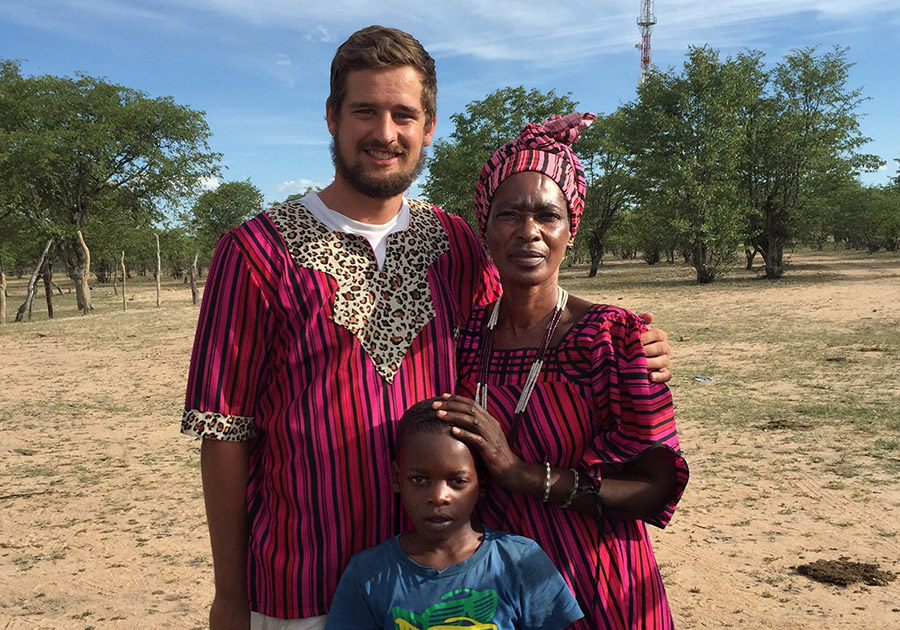On the first morning of his homestay in the rural village of Outapi, Namibia, Richard Wehman ’17 woke up at 6 a.m. and started hoeing the family’s farm. Alongside him were the people he affectionately refers to as “my mother and two brothers.” After working the farm, he and the men in the family went to the grandmother’s house where they prepared a pig for lunch. Some of the male relatives had killed it and it was Wehman’s job to skin it— probably not what he imagined when he set off for study abroad in January of 2016.
His program was titled “Nation building, globalization and decolonizing the mind” and took place in both Namibia and South Africa. He had chosen it, in part, because he wanted to challenge himself to step out of his comfort zone. “I didn’t know anything about South Africa. I didn’t know anyone,” he says. He spent roughly three weeks there before moving on to Namibia. In South Africa, they learned about apartheid. Wehman’s favorite class was “Racism and Resistance in Southern Africa and the US.” He says, “we explored the parallels between apartheid and slavery and really got to learn about the legacy of apartheid and how that still impacts housing and education today.”
During his time in Namibia, Wehman, a communication major, made deep connections with the people in his community. He had two separate homestays—one in a township outside the capital and the other in a rural village. He was so fond of one of the families that he revisited them, bringing gifts. While he lived in Katutura, Wehman volunteered at the Basketball Artists School, an after-school program for kids from low-income families. He loved tutoring the kids in math and English, and then helping teach basketball afterwards. Noting the potential of sports to “inspire, motivate, and transform children,” Wehman describes how powerful it was to work with these kids. He realized that this wasn’t an organization that simply trained basketball players but rather it was a refuge for many of the children. With pride, he speaks of the program’s dedication to building leaders and hard workers.
He also spent the weekend at the Namib Desert Environmental Education Trust, a non-profit that promotes environmental awareness and education. Here, he and his peers got to authentically experience sustainable living rather than merely learning about it in a classroom. Recalling his experience, Wehman nostalgically reminisces about solar-cooked pizza, bucket showers, and the brightest stars he’s ever seen.
Reflecting on his time in South Africa and Namibia, Wehman remarks that his experiences left him changed in numerous ways. He says, “The people I interacted with were totally different from myself. They were very committed to social change, development, and justice. I was educated on a lot of different things.” Additionally, Namibia is in the middle of a severe drought. Wehman explains, “In the capital city a law was passed while I was there that swimming pools can no longer be filled.” After living with such limited water, Wehman mentions that he has become more conscious about his own water usage at home.
When asked about the value of study abroad, Wehman answers, “I think its great to step outside of your comfort zone and have new experiences and meet new people. Get out of Granville, Ohio because you will gain a lot of different tools and skills that you can translate back to life in America.” Indeed, Wehman has translated certain aspects of his experience back to life in the US. His time at the Basketball Artists School has renewed his interest in philanthropy. He asserts that he plans to involve himself in philanthropic organizations after he graduates and returns back home. After visiting several wine estates while studying abroad in Cape Town, Wehman became fascinated, leading him to start the Denison Wine Society back at school.
Summing up his time in the two countries, Wehman thoughtfully says, “I came for the experience but left with a great deal of knowledge.”


